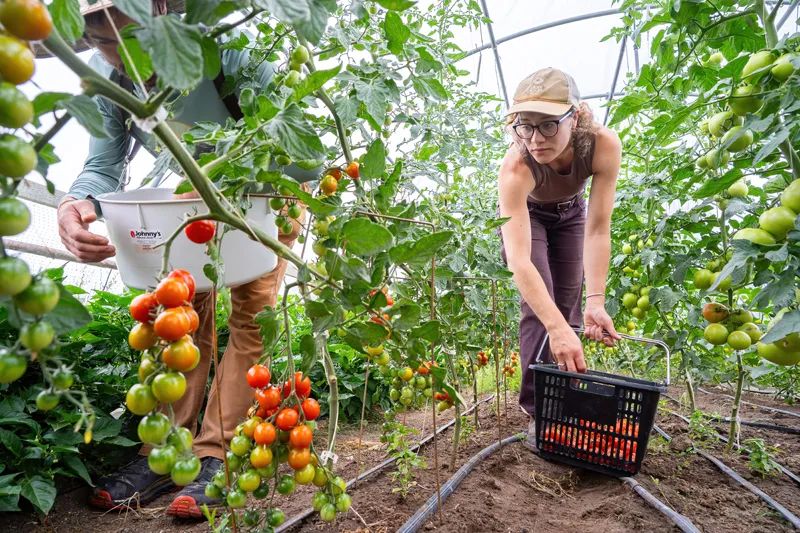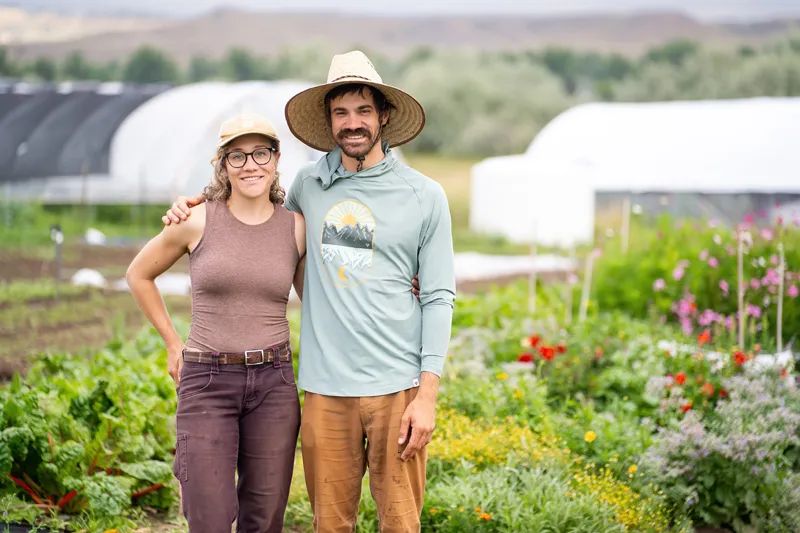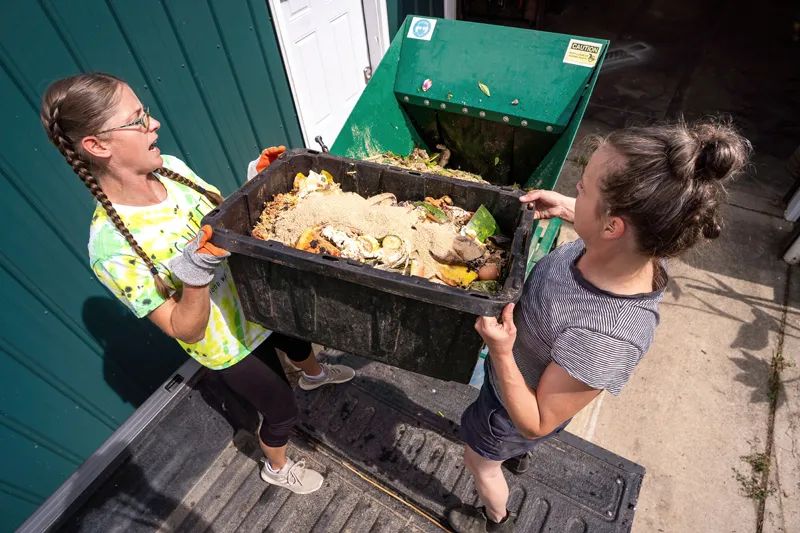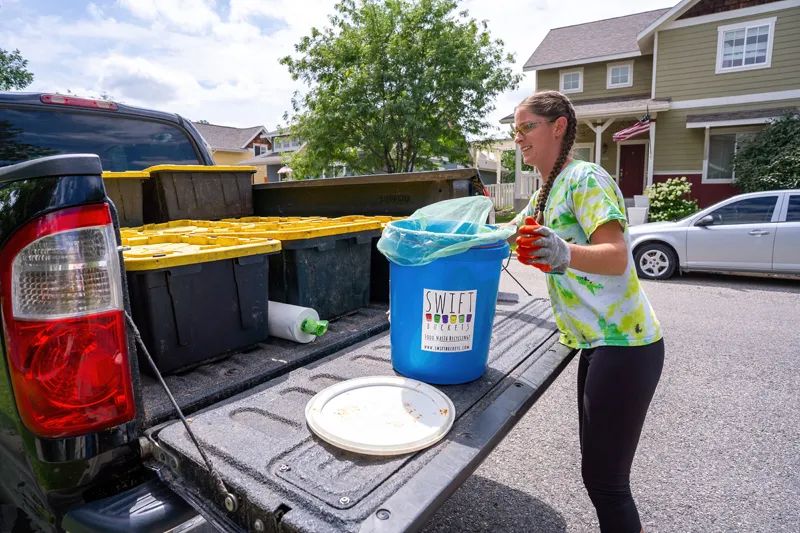
From Scraps to Soil
The women who are growing a grassroots movement from the ground up.
Jessica Hart isn’t afraid to get her hands dirty — she thrives on it. A passionate steward of the soil, she believes that healthy earth is the key to healthy food. That belief runs so deep, she helped co-found Swift Buckets, a company turning everyday waste into garden gold. From backyard beds to full-scale plots, Jessica is on a mission to breathe life back into the land — one bucket at a time.
Swift Buckets is a kitchen waste recycling program that anyone can subscribe to. For a monthly or annual fee, customers get 5-gallon buckets that they fill with kitchen waste or compostables, which are then picked up weekly. Those scraps are fermented into a soil conditioner full of micronutrients called Big Sky Bio.
“I am excited and passionate about soil health,” Jessica says enthusiastically.
After working at organic farms in California, in Gualala and Laytonville, north of San Francisco, Jessica returned home to Billings where she and business partner Patrick Certain dreamt up the idea of creating Swift Buckets in late 2017. Patrick, who holds a degree in sustainable food and bioenergy systems, had also worked on farms and composting businesses around the world. He wanted to recycle food waste into a product that could enrich the soil.

Swift Buckets is not Jessica’s first foray into agricultural products. She and her husband, Reed Youngbar, along with Patrick, first started Swift Microgreens.
“Microgreens were popular in California,” Jessica says. “So, when we came back to Montana, we thought it would be popular here.”
When the concept did not catch on, “We were shocked pretty quickly,” she recalls. “It was not what we thought it would be.” Many people turned their noses up at the thought of adding microgreens to their daily diet. Even with offers of free samples at the farmers market, they couldn’t get potential customers to bite.
You could call Swift Microgreens the happy accident that led to their latest endeavor. They turned to recycling out of sheer necessity. Since the greens were grown on fiber mats, Jessica says, “We were producing a lot of compostable waste.”
When Patrick left to pursue an opportunity to work on a farm in Missoula, Jessica and her husband decided to abandon microgreens and focus fully on composting.
These days, Jessica’s parents, Dwayne and Jane, and Jessica’s close friend, Chrissy Willis, are also partners in Swift Buckets. “I started doing pickups when the kids were in elementary school,” Chrissy says. “Jessica and I were having coffee one day, and she asked me to help.” That was five years ago, and Chrissy has been an equal partner since 2023.

The actual processing and fermenting of food waste occurs in a garage owned by Jessica’s parents. The space not only handles production but also provides storage and lab space for the company.
Swift Buckets uses a special way to break down food waste called the Bokashi method. Instead of using air like traditional composting, Bokashi works without oxygen. Food scraps are placed in a sealed container and a mix called Bokashi bran (made from bran and helpful bacteria developed by Dr. Larry Green in Washington) is sprinkled on top to help break it down.
Over the course of three months, the scraps ferment — kind of like pickling. During this time, a nutrient-rich, acidic juice is created, which can be drained and used as a natural fertilizer. The remaining solids can be tilled into garden soil to bring it to life or it can be added to a regular compost pile.
“This method doesn’t create methane gas, like regular composting,” Jessica says. “It ferments the food waste instead, breaking it down with good bacteria. The liquid we drain helps enrich the soil by boosting bacteria growth.”
Over in Laurel, on the first-generation, small-scale vegetable farm known as Stone Soup Garden, Claire Overholt uses Swift Buckets’ pulp for composting and the soil conditioner for her land. Claire co-owns the garden with her partner, Patrick Certain — Jessica’s former business partner.
“The nutrients give a leg up to the starts, especially for Montana weather,” Claire says. Stone Soup Garden grows 40 different crops, ranging from greens and garlic to herbs and seasonal crops like tomatoes and zucchini. “Our goal is to grow through December in the greenhouse this year,” she adds.

As you chat with these women, you see how woven they are into each other’s enterprises. Not only does Claire use the pulp and Big Sky Bio from Jessica’s Swift Buckets, she turns to the Charter Ranch for what’s called vermicast. It’s an organic fertilizer created by worms that have eaten compost and then excreted it into a nutrient-rich waste product, which plants love.
“Vermicast is compost on steroids,” says Steve Charter, the owner of the ranch. Instead of insecticides and synthetic fertilizers, vermicast helps improve the long-term health of the soil.
Steve’s daughter, Annika, continues the three-generation ranching tradition and has used the Yellowstone Valley Food Hub as a way to bring her family’s meat directly to consumers. “I got Dad’s vermicast connected to the Food Hub. Now Swift Buckets buys the vermicast from us,” Annika says.
The good news is, these products are not solely for commercial operations. Any home gardener can buy them at the Yellowstone Valley Food Hub.
“The soil amendments fit in with our mission to help create a localized food system,” says Clare Jurczak, general manager of the Yellowstone Valley Food Hub. “When you garden yourself, you know how hard it is, and so you appreciate farmers.”
Clare hopes that by educating others, they will either try composting to reduce waste or turn to Swift Buckets to help get the job done.
“Forty percent of food is wasted,” she says. She also touts the Food Hub as a way to keep that waste to a minimum. “Customers order weekly what they want, allowing producers and farmers to select the items sold that week. The food doesn’t sit on a shelf waiting to be purchased,” she says. Food also does not spoil in the process.
As Claire Overholt looks at her own garden operation, she sees something deeper than soil. She sees a community that is working toward healthy food production — a community she loves to lean on.
“It’s a great way to support locally owned and locally started, women-run businesses,” she says. “We’re making a closed-loop system.”











